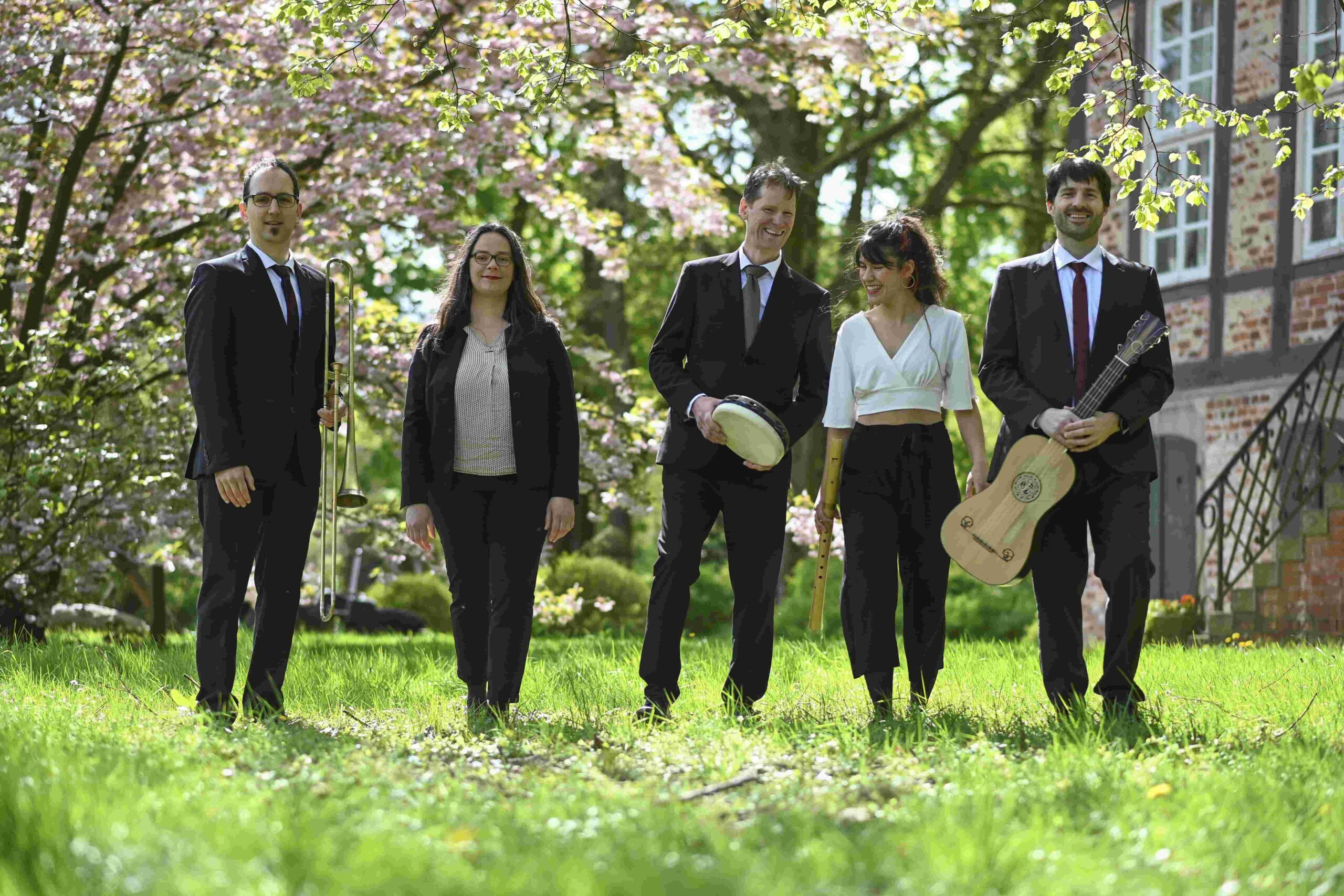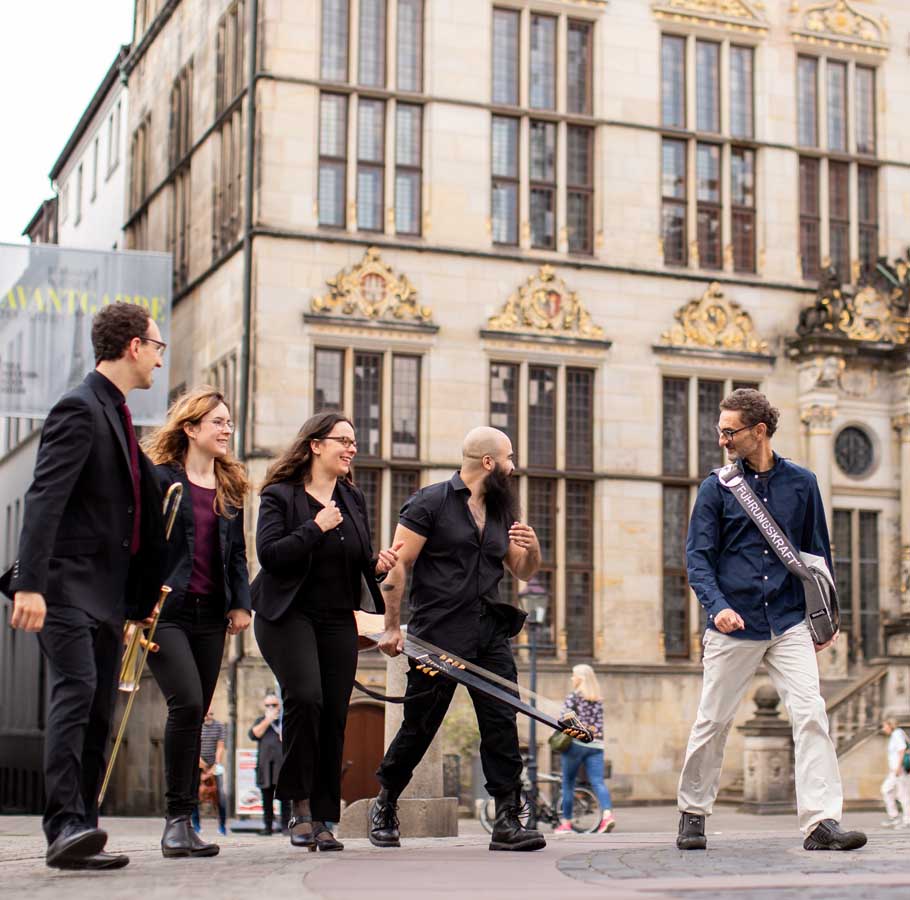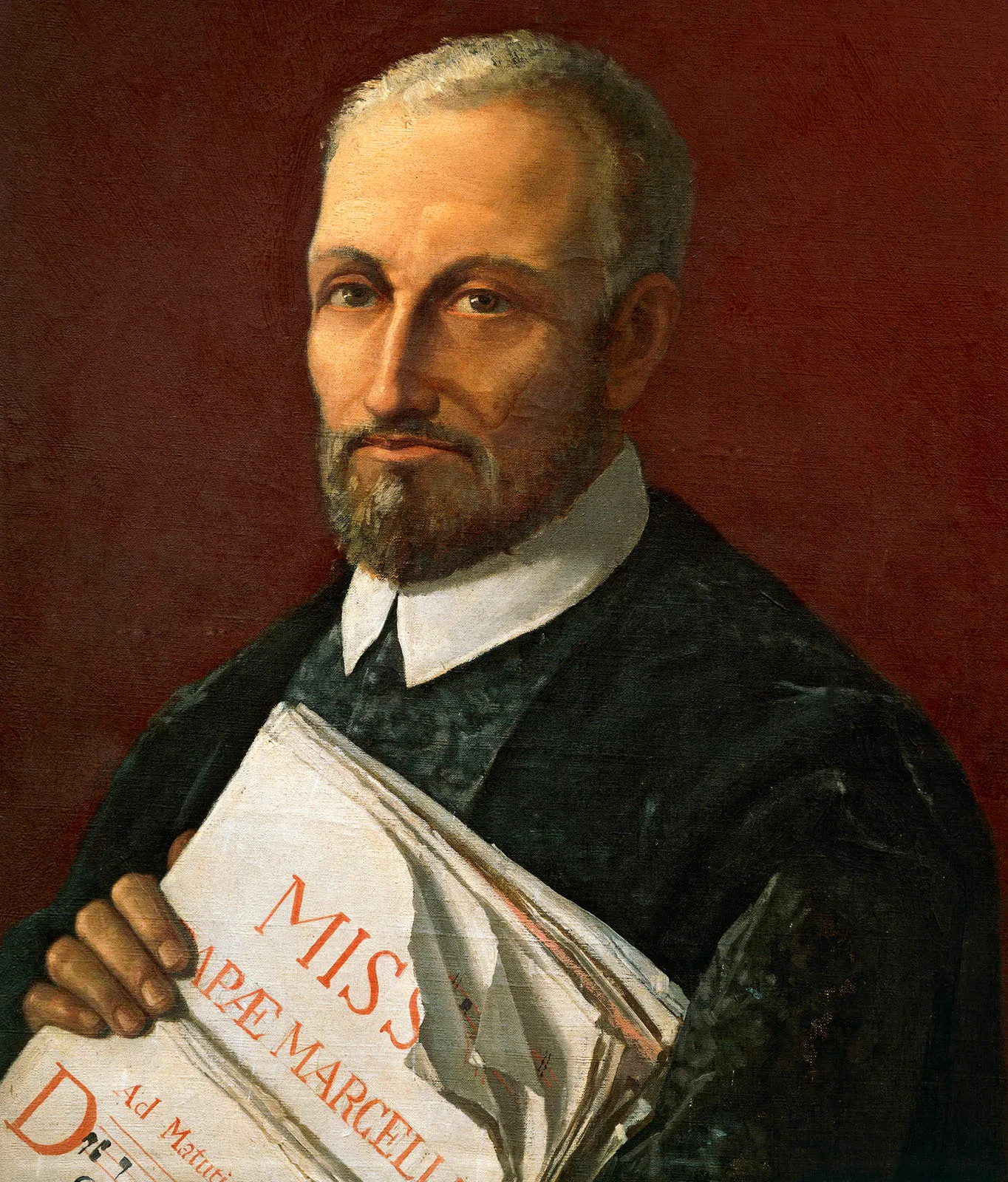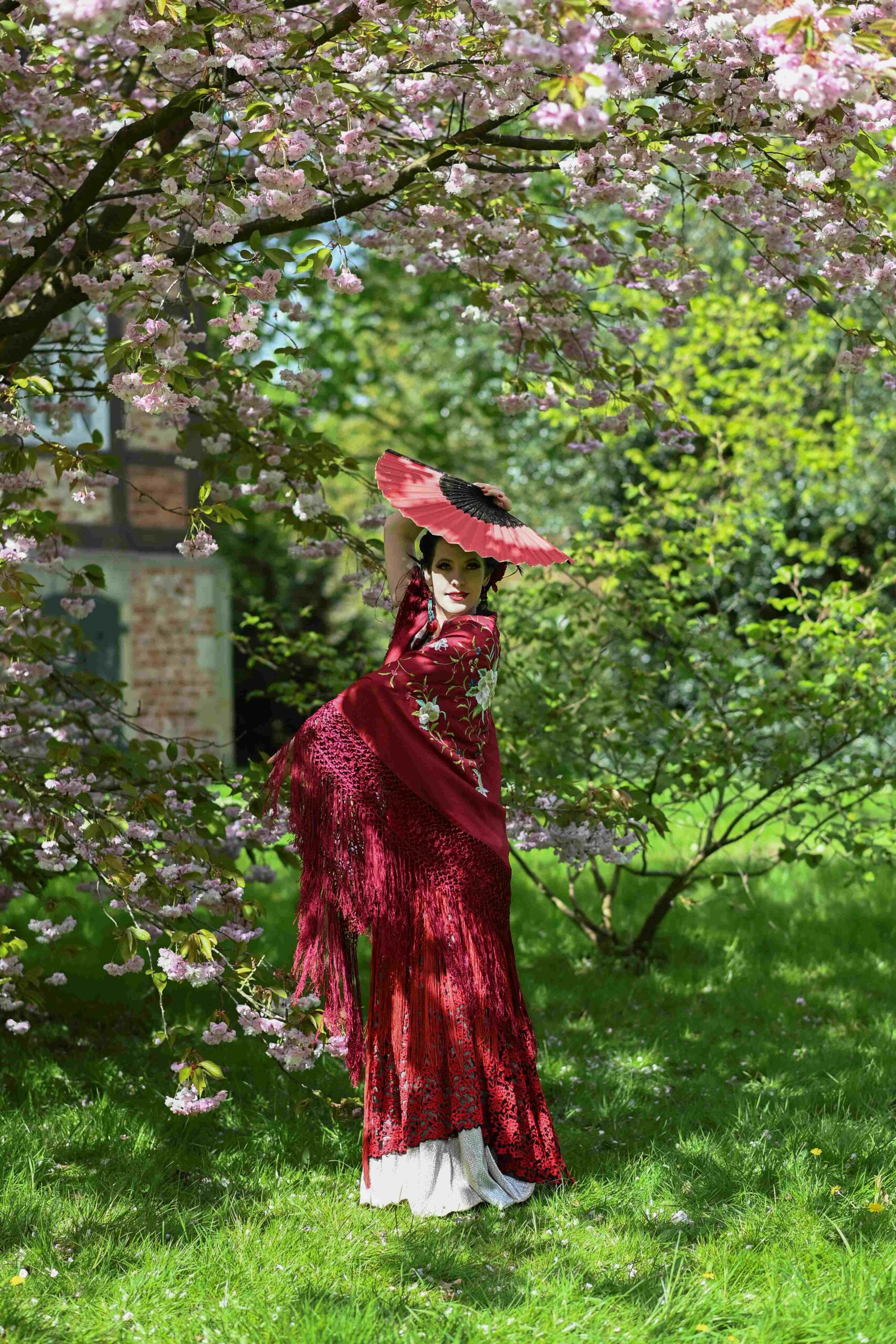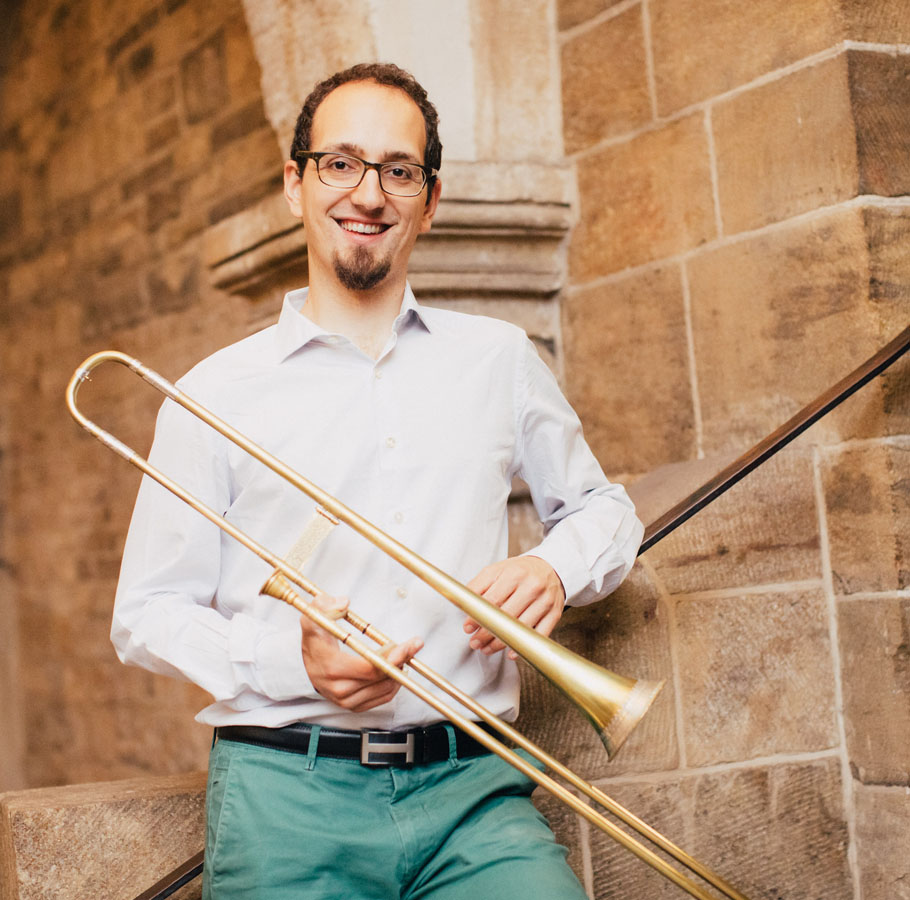
Juan González Martínez
...blows his solo pieces with immense delicacy, wonderful timing in recitative passage - and the ability to sing on his instrument.
Upcoming concerts
Fiestas de Primavera
KonzertStattReise - Smoke signals from the Tabakquartier
Fiestas de Primavera
Fandango – Inspiración (CD-Release!)
KonzertStattReise - The Bremen Town Musicians 2.0
Españoletas - Spanish wind
Españoletas - Spanish wind
Españoletas - Spanish wind
KonzertStattReise - The Bremen Town Musicians 2.0
KonzertStattReise - The Bremen Town Musicians 2.0
Arabesque
Arabesque
KonzertStattReise - Smoke signals from the Tabakquartier
Arabesque - in dance dialog with Al-Andalus
KonzertStattReise - The Bremen Town Musicians 2.0
KonzertStattReise - The Bremen Town Musicians 2.0
Fiestas de Primavera
KonzertStattReise - Smoke signals from the Tabakquartier
Fiestas de Primavera
Fandango – Inspiración (CD-Release!)
KonzertStattReise - The Bremen Town Musicians 2.0
Españoletas - Spanish wind
Españoletas - Spanish wind
Españoletas - Spanish wind
KonzertStattReise - The Bremen Town Musicians 2.0
KonzertStattReise - The Bremen Town Musicians 2.0
Arabesque
Arabesque
KonzertStattReise - Smoke signals from the Tabakquartier
Arabesque - in dance dialog with Al-Andalus
KonzertStattReise - The Bremen Town Musicians 2.0
KonzertStattReise - The Bremen Town Musicians 2.0
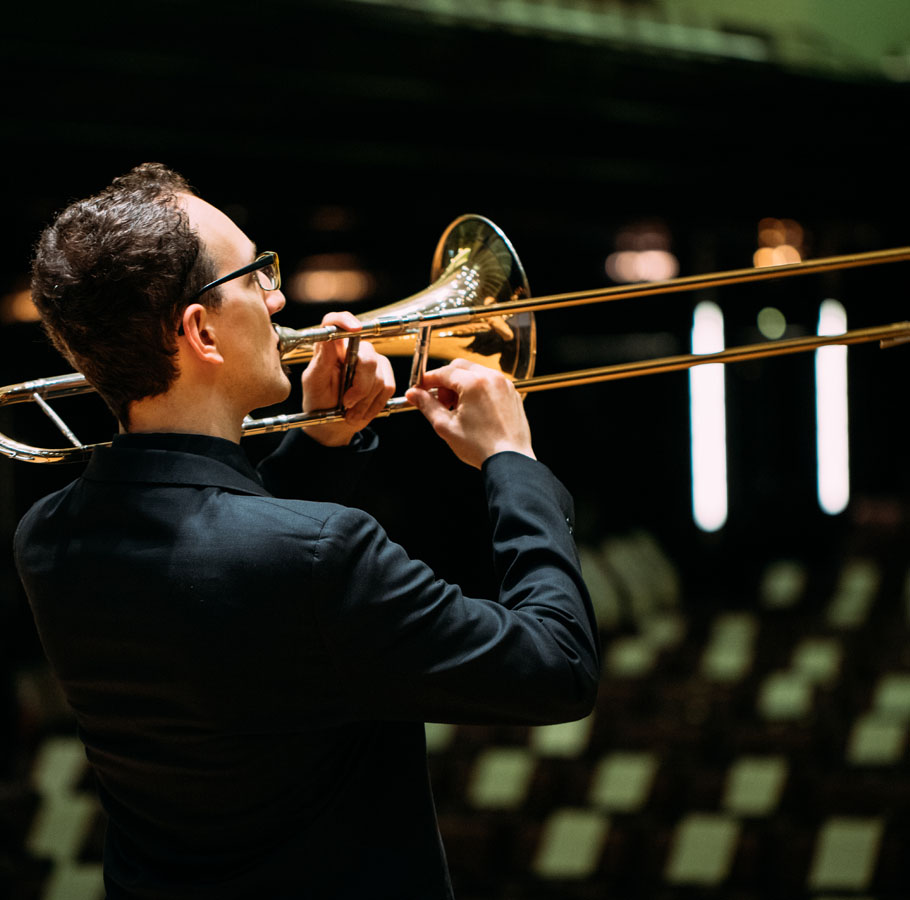
Sackbut & historic trombone player from northern Germany with Spanish roots
Der Barockposaunist Juan González Martínez gilt als einer der vielseitigsten Posaunisten der Nachwuchsgeneration im Bereich der historischen Aufführungspraxis. Er spielt auf Instrumenten von der Renaissance bis in die Romantik und beschäftigt sich mit der historischen Spielweise, mit dem Ziel, sein Publikum mit einem warmen, sanglichen Klang zu berühren.
Projects and ensembles
with and around the baroque trombonist Juan González Martínez
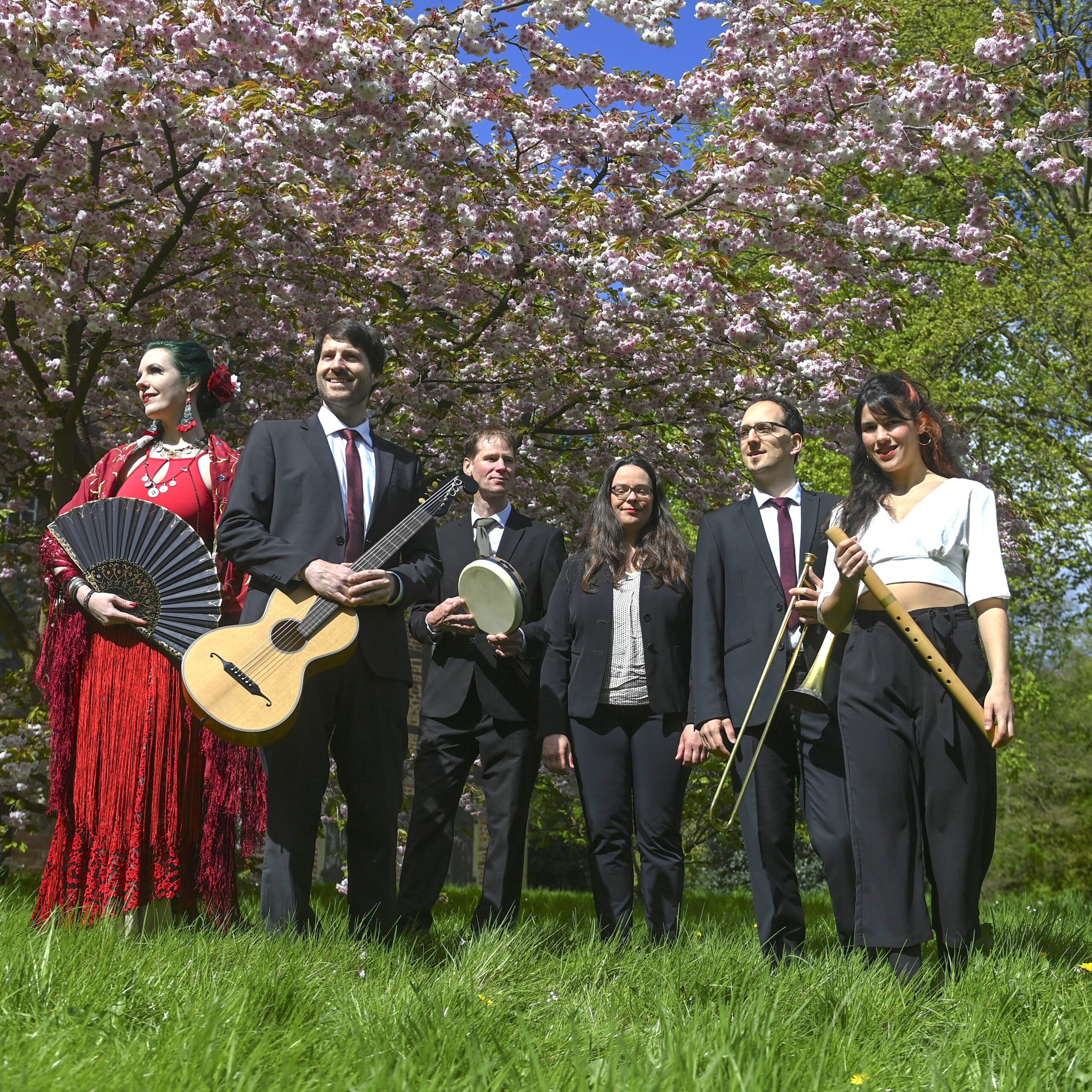
Concierto Ibérico
Spanish music from the Renaissance and Baroque periods and their influences on all of Europe are the focus of the work of our ensemble Concierto Ibérico.
We play this music on various historical instruments, with each musician mastering several wind, keyboard or plucked instruments; entirely in the spirit of the historical sources, where for this repertoire the term "all kinds of instruments" is often used. Occasionally we also work together with dancers or singers.
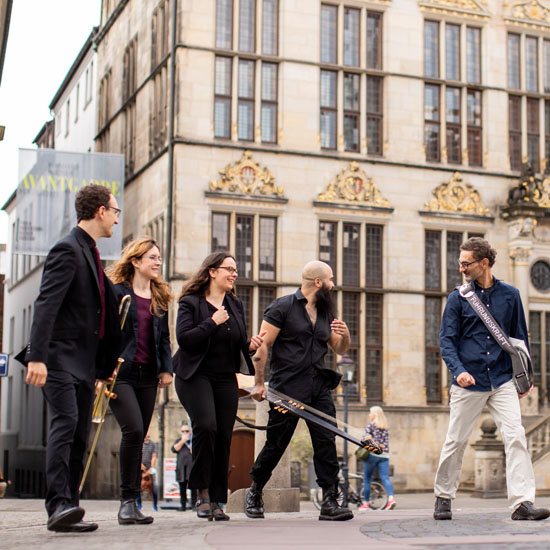
KonzertStattReise:
City tour with concert
When the ensemble Concierto Ibérico plays on many different historical instruments for a guided tour of the city, there won't be a dry eye in the house. Together with this young quartet, experience old Bremen in a whole new way: with historical facts, curious stories - and the lively music of the real town musicians of past centuries!
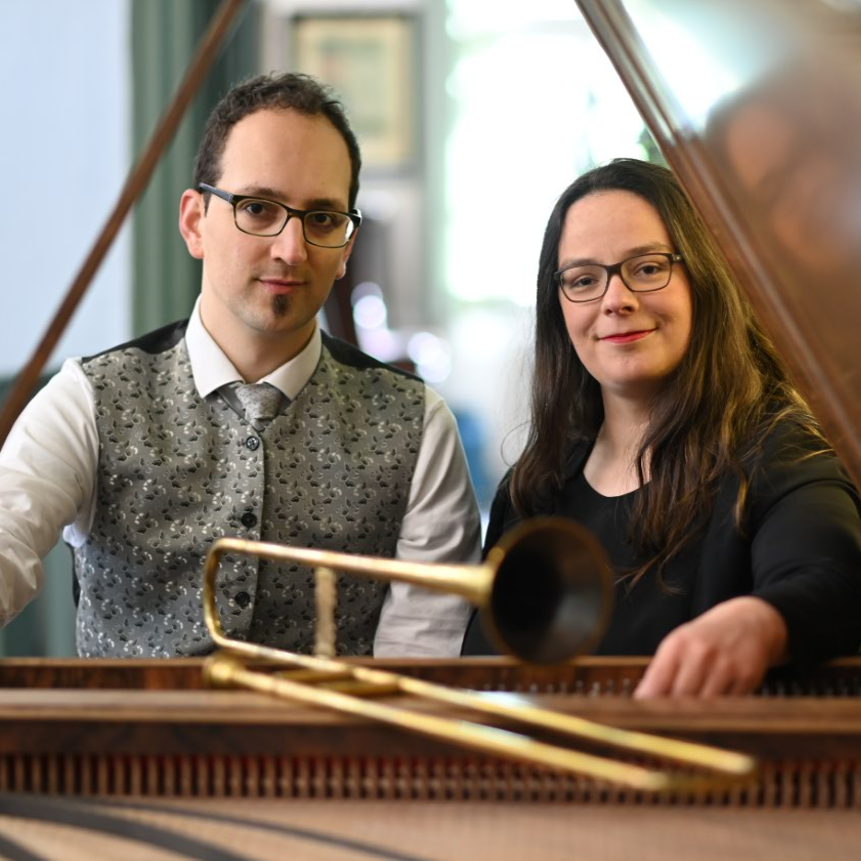
Duo GlossArte
Inspired by the art of ornamentation, the Duo GlossArte has set itself the goal of researching and playing the literature for trombone and harpsichord, as well as organ on historical instruments or their replicas. The musicians are always on the lookout for the original sound of the respective period and region and perform both as a duo and as soloists with baroque orchestras and in cooperation with chamber music ensembles.
"The interaction with his excellent partner Lea Suter on the organ in Max Peters' highly dramatic Elegy op. 9, is equally demanding for both protagonists. The performance by Ms. Suter masterfully - also with regard to the art of registration and colorfulness - masterfully used by Ms. Suter organ in Bremen's concert hall "Die Glocke" rounds off the pleasure."
Thomas Baack on his debut CD "Trombone & Organ" with Duo GlossArte & the Franz Kuhn Trombone Quartet, Klassik Heute (04/2022)
"Juan González Martínez's solo trombone blended so well with the organ sounds that, with your eyes closed, you dreamed of a corresponding organ stop"
Martin Scheibner. Concert on April 6, 2022 in the Historische Stadthalle in Wuppertal. Rheinisches Blechblatt, 2nd quarter 2022
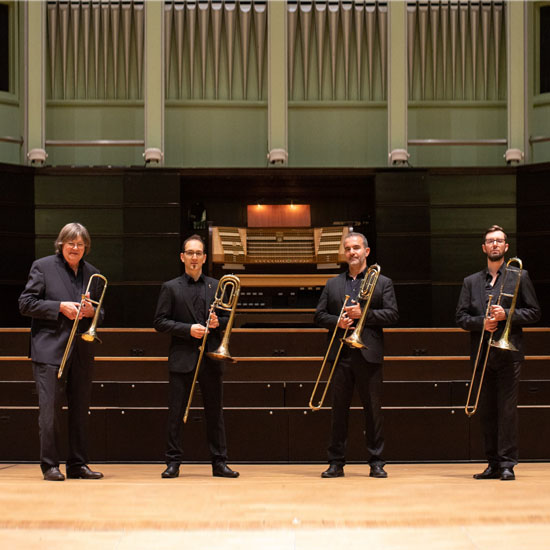
Franz Kuhn Trombone Quartet
The Franz Kuhn Trombone Quartet was founded by Juan González Martínez and consists of specialists in historical trombone instruments. The quartet has at its disposal a complete set of trombones (alto, tenor and two bass trombones) from the 1920s by Franz Kuhn. At the same time, the musicians are studying the historical-romantic style of playing, especially on the basis of notes and copies from the estate of Paul Weschke (1867-1940).
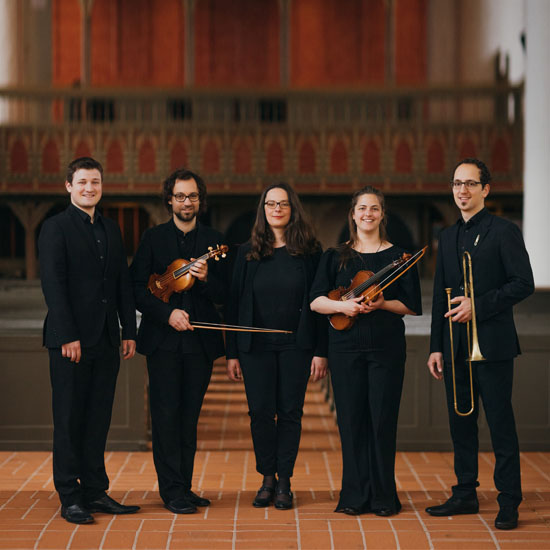
Weckmann Consort
The Weckmann Consort was founded by musician and organ builder Lea Suter. The musicians use historical instruments to research the sounds that their namesake, the Hamburg Jakobi organist Matthias Weckmann (1619-74), might have heard.
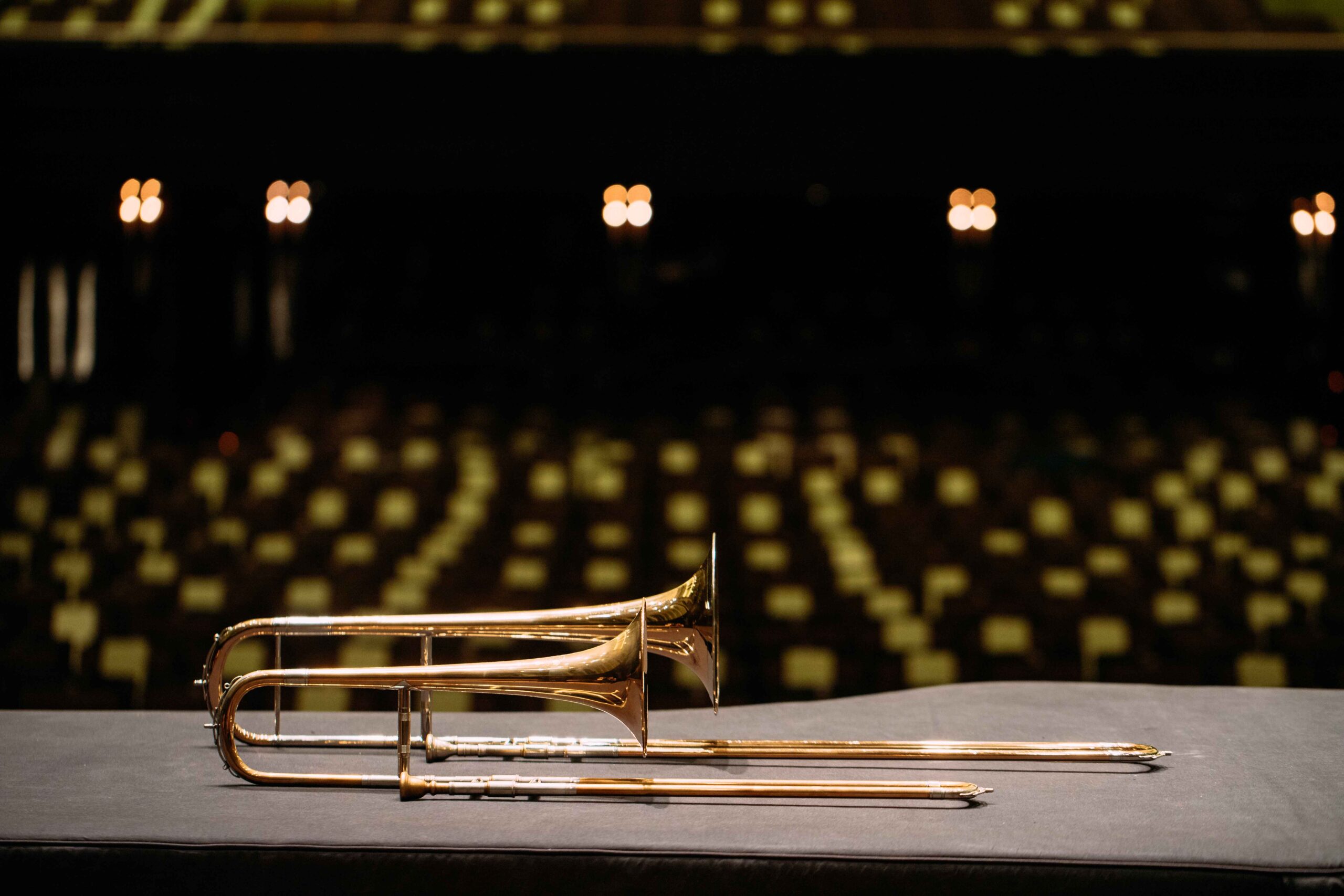
Instruments
Historical trombones
The specialist for historical trombones has a versatile range of instruments at his disposal, which he constantly complements with care and the finest taste. Fascinated by the subtle soundscapes from the Renaissance to the Romantic period and the musical context in which the trombone plays an important role, Juan González Martínez shows his instruments and the works in which he uses them.
Media
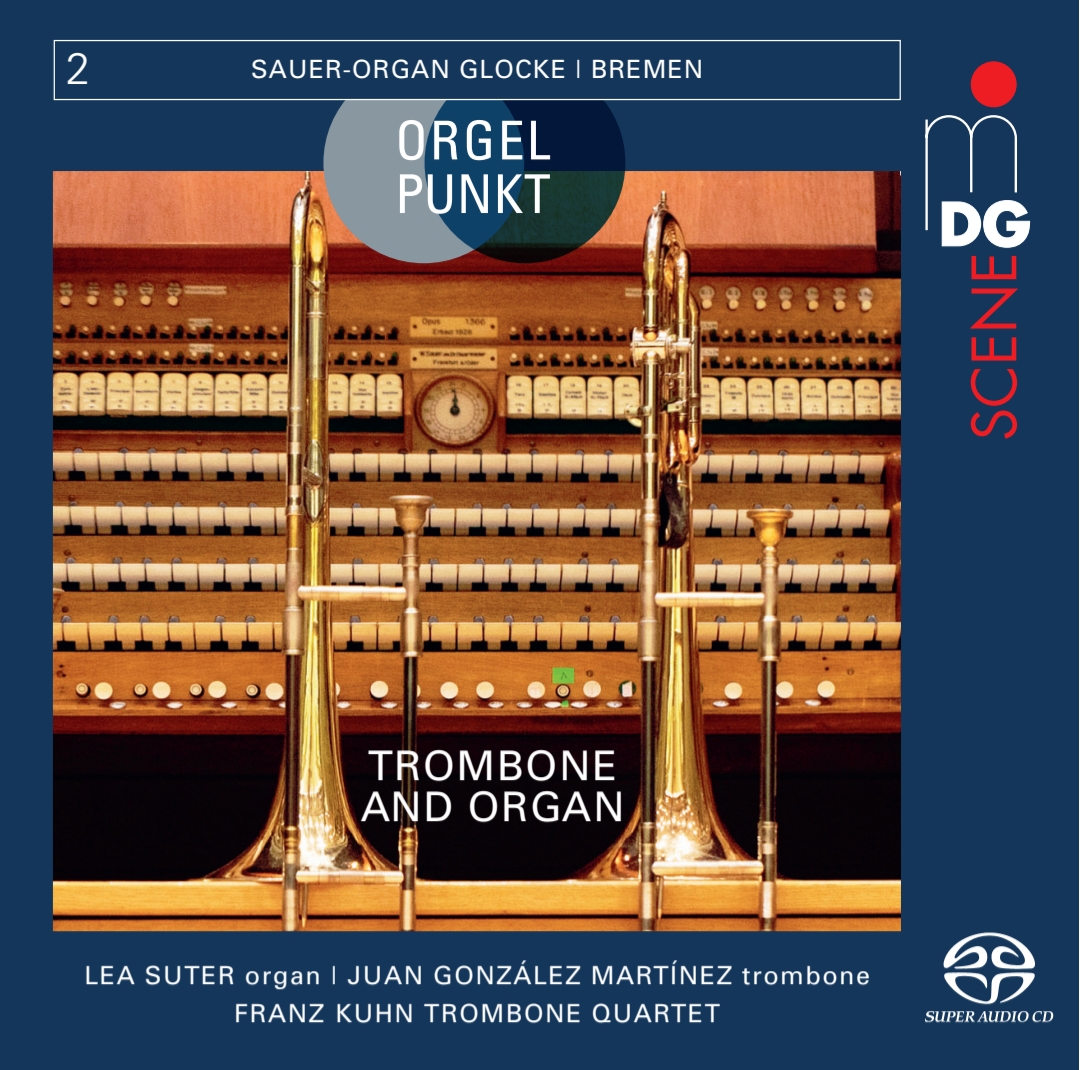
Orgelpunkt - Trombone and Organ
The Duo GlossArte has worked intensively on the Romantic period. This has resulted in a CD, including first recordings of various works on the historic Sauer organ (1928) in the large hall of the Glocke, Bremen's concert hall from 1926, together with the historic Franz Kuhn trombone (1920). These are not only works recorded for the first time, but also original preserved historical instruments recorded for the first time as a duo and in a quartet.
Upcoming concerts
Fiestas de Primavera
KonzertStattReise - Smoke signals from the Tabakquartier
Fiestas de Primavera
Fandango – Inspiración (CD-Release!)
KonzertStattReise - The Bremen Town Musicians 2.0
Españoletas - Spanish wind
Españoletas - Spanish wind
Españoletas - Spanish wind
Fiestas de Primavera
KonzertStattReise - Smoke signals from the Tabakquartier
Fiestas de Primavera
Fandango – Inspiración (CD-Release!)
KonzertStattReise - The Bremen Town Musicians 2.0
Españoletas - Spanish wind
Españoletas - Spanish wind
Españoletas - Spanish wind

Sackbut & historic trombone player from northern Germany with Spanish roots
Der Barockposaunist Juan González Martínez gilt als einer der vielseitigsten Posaunisten der Nachwuchsgeneration im Bereich der historischen Aufführungspraxis. Er spielt auf Instrumenten von der Renaissance bis in die Romantik und beschäftigt sich mit der historischen Spielweise, mit dem Ziel, sein Publikum mit einem warmen, sanglichen Klang zu berühren.
Projects and ensembles
with and around the baroque trombonist Juan González Martínez
Concierto Ibérico
Spanish music from the Renaissance and Baroque periods and their influences on all of Europe are the focus of the work of our ensemble Concierto Ibérico.
We play this music on various historical instruments, with each musician mastering several wind, keyboard or plucked instruments; entirely in the spirit of the historical sources, where for this repertoire the term "all kinds of instruments" is often used. Occasionally we also work together with dancers or singers.


KonzertStattReise:
City tour with concert
When the ensemble Concierto Ibérico plays on many different historical instruments for a guided tour of the city, there won't be a dry eye in the house. Together with this young quartet, experience old Bremen in a whole new way: with historical facts, curious stories - and the lively music of the real town musicians of past centuries!
Duo GlossArte
Inspired by the art of ornamentation, the Duo GlossArte has set itself the goal of researching and playing the literature for trombone and harpsichord, as well as organ on historical instruments or their replicas. The musicians are always on the lookout for the original sound of the respective period and region and perform both as a duo and as soloists with baroque orchestras and in cooperation with chamber music ensembles.
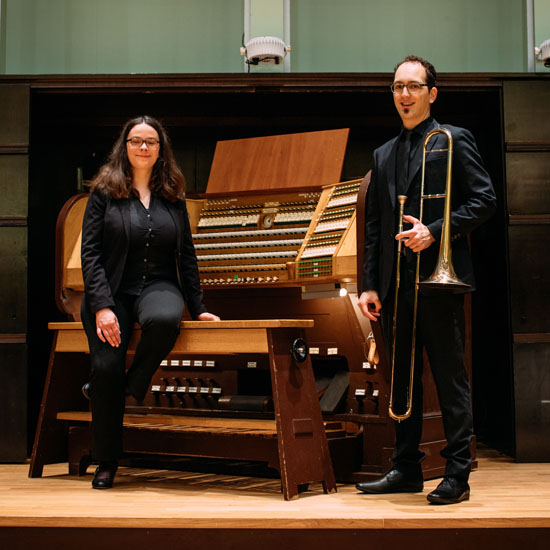
Franz Kuhn Trombone Quartet
The Franz Kuhn Trombone Quartet was founded by Juan González Martínez and consists of specialists in historical trombone instruments. The quartet has at its disposal a complete set of trombones (alto, tenor and two bass trombones) from the 1920s by Franz Kuhn. At the same time, the musicians are studying the historical-romantic style of playing, especially on the basis of notes and copies from the estate of Paul Weschke (1867-1940).


Weckmann Consort
The Weckmann Consort was founded by musician and organ builder Lea Suter. The musicians use historical instruments to research the sounds that their namesake, the Hamburg Jakobi organist Matthias Weckmann (1619-74), might have heard.


Instruments
Historical trombones
The specialist for historical trombones has a versatile range of instruments at his disposal, which he constantly complements with care and the finest taste. Fascinated by the subtle soundscapes from the Renaissance to the Romantic period and the musical context in which the trombone plays an important role, Juan González Martínez shows his instruments and the works in which he uses them.
Media

Orgelpunkt - Trombone and Organ
The Duo GlossArte has worked intensively on the Romantic period. This has resulted in a CD, including first recordings of various works on the historic Sauer organ (1928) in the large hall of the Glocke, Bremen's concert hall from 1926, together with the historic Franz Kuhn trombone (1920). These are not only works recorded for the first time, but also original preserved historical instruments recorded for the first time as a duo and in a quartet.


